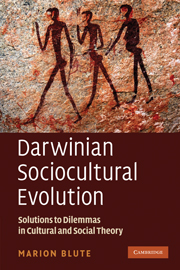Book contents
- Frontmatter
- Contents
- Preface: a postmodern metanarrative
- Acknowledgments
- 1 Introduction
- 2 History: where did something come from?
- 3 Necessity: why did it evolve?
- 4 Competition, conflict and cooperation: why and how do they interact socially?
- 5 The ideal and the material: the role of memes in evolutionary social science
- 6 Micro and macro I: the problem of agency
- 7 Micro and macro II: the problem of subjectivity
- 8 Micro and macro III: the evolution of complexity and the problem of social structure
- 9 Evolutionism and the future of the social sciences
- References
- Index
4 - Competition, conflict and cooperation: why and how do they interact socially?
Published online by Cambridge University Press: 05 June 2012
- Frontmatter
- Contents
- Preface: a postmodern metanarrative
- Acknowledgments
- 1 Introduction
- 2 History: where did something come from?
- 3 Necessity: why did it evolve?
- 4 Competition, conflict and cooperation: why and how do they interact socially?
- 5 The ideal and the material: the role of memes in evolutionary social science
- 6 Micro and macro I: the problem of agency
- 7 Micro and macro II: the problem of subjectivity
- 8 Micro and macro III: the evolution of complexity and the problem of social structure
- 9 Evolutionism and the future of the social sciences
- References
- Index
Summary
COMPETITION, CONFLICT AND COOPERATION
In the social sciences, historically, economists have emphasized competition over social (strategic) interaction although that has begun to change with game theory, an increasingly important part of microeconomics. Anthropologists, sociologists and political scientists on the other hand have emphasized social cooperation and conflict, traditionally in the form of functionalism and a variety of descendants of Marxism, even though common sense dictates that not all social relationships are cooperative nor are all antagonistic. There, too, game theory is becoming more prominent (Abell 2000). Instead of either the competition or the conflict versus cooperation approach to social relationships and interaction, this chapter adopts the biologists' three-cornered distinction among all three. This helps make clear some general principles under which these alternatives should be expected to be observed as well as their likely consequences.
Some examples of the inferences that can be drawn are that things that are often seen as going hand in hand, such as environmental depletion and degradation, can be distinguished as consequences of different courses of action. On the other hand, some things which are traditionally seen as opposed, such as liberal and conservative views of crime as well as conflict and cooperation, may proceed hand in hand. We then go on to explore the use of such concepts in understanding the nature of proto-gender and gender differences and relationships – the most fundamental social relationship that exists among unrelated peers.
- Type
- Chapter
- Information
- Darwinian Sociocultural EvolutionSolutions to Dilemmas in Cultural and Social Theory, pp. 80 - 112Publisher: Cambridge University PressPrint publication year: 2010



